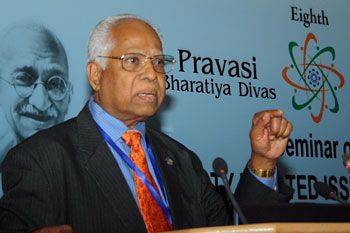 | « Back to article | Print this article |
NRIs demand right to protect their property in India
Susheela Verma, an attorney in the United States, bought some land in Haryana in 1999. She sent money to her nephew to build a 10,000 sq ft house, which was completed in 2006.
When she came to India, she realized her brother had taken possession of the house. Since then, she has approached every police station and court in the land, but to no avail. At one point, she was so afraid that her brother will kill her, she 'escaped' from a third floor window of her own house!
Verma, who spoke at a seminar on buying property in India at the eighth Pravasi Bharatiya Divas in New Delhi, says her brother still lives in the house while she remains powerless. Click NEXT to read on further. . .
NRIs demand right to protect their property in India
"In the last year, Non-Resident Indians have remitted $53 billion to India. It is their hard-earned money. Don't they have the right to protect their property?" asked Dr Shreedhar Kavil, chairman, global advisory board, World Malayalee Council, New York.
"A thug can take over your property by bribing a sub-registrar. After 12 years, the property would become his. Your government protects these thugs," said Kavil, who had to fight a legal battle to win back his property when the government took it over. He said while arguing the case, some of the points his lawyer raised were:
- Land bought by NRIs should be labeled NRI property.
- In case there is any change in the title deed, the NRI should be informed by the sub-registrar within ten days.
- A power of attorney registered abroad would be valid only when the Indian Consulate attests it.
- In property disputes involving NRIs, the time limit for appeal should exclude the time the NRI spent abroad.
NRIs demand right to protect their property in India
Scores of NRIs like Verma and Kavil attended the seminar on property where the Indian government tried to convince the Diaspora that buying land in India is good.
Vivek Gogia, Additional Commissioner of Police, economic offences wing, Delhi Police, agreed that NRIs usually came with two complaints -- tenants who refuse to vacate their premises, and builders who do not deliver on time -- both of which are criminal offences.
In order to overcome these obstacles, the government is proposing to come up with the Real Estate Regulatory Law, Kumar Gera, chairman, Confederation of Real Estate Developers Associations of India. The law would bind developers, local government authorities, buyers and financing institutions.
"Don't buy open land. It is difficult to protect from encroachers. Be diligent when looking at the legal aspect. High return means high risk. Do not buy land with black money. Always insist on a full cheque payment. Do not follow the herd. Always read the agreement. Get a lawyer to read it. Go for a house that comes with a five-year warranty," he said.
NRIs demand right to protect their property in India
Government representatives too had some advice for potential NRI buyers.
"NRIs can buy residential and commercial property in India but not agricultural property. If they want to buy agricultural land, they have to obtain permission from the Reserve Bank of India, which can give its approval only after consulting the government of India. NRI s cannot even receive agricultural property as gifts in India," former chairman of the Law Commission of India, Justice A R Lakshmanan, said, adding that fast track courts should be set up by the states to deal exclusively with NRI property matters.
Former chairman of the Law Commission of India, Justice Lakshmanan sets down seven thumb rules NRIs should follow when buying property in India:
1. Have title deeds, parent deeds in original
2. Documents to prove ownership like death certificate and legal heir certificate. Will and probate. Also documents to show the relationship between parties.
3. Revenue documents, town survey extract, tax assessment and receipts.
4. Encumberance certificate for a minimum of 30 years.
5. Layout sanction and planning permission.
6. Electricity connection documents.
7. Positive identity of the vendor.
NRIs demand right to protect their property in India
Justice A M Ebrahim, a retired judge of the Supreme Court of Zimbabwe, said after illegal occupation, the biggest hurdle NRIs face is he said was delayed court proceedings.
"Always have a written contract. Have a settlement clause in case of disputes. Have a timeline for dispute resolution. Mention arbitrators and also an appeal process in the contract," he suggested.
"We want to participate in the growth of our motherland. . . in the Indian economy."




